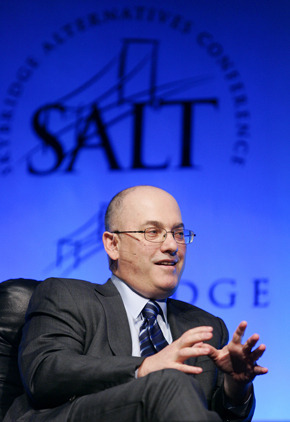John Cassidy's Blog, page 77
April 3, 2013
Janet Yellen: A (Female) Keynesian at the Fed?

With Ben Bernanke’s term as chairman of the Federal Reserve up at the end of January, 2014, the speculation about the identity of his successor is starting in earnest. Two recent articles in The Economist and at the Washington Post’s Wonkblog have both made Janet Yellen, who is currently Bernanke’s number two on the Fed’s board of governors, the firm favorite for the job. Slate’s Matt Yglesias reckons her accession isn’t even in doubt, saying bluntly, “it’ll be Janet Yellen.”
Other possible candidates include Larry Summers, Tim Geithner, and Bernanke himself, although it’s been widely reported that Geithner isn’t interested and Bernanke doesn’t want to be reappointed. Given Yellen’s résumé, she’s a justifiable favorite. Before taking her current job, in 2010, she served for six years as President of the San Francisco Fed, one of the twelve regional reserve banks. She’s also got political experience and close ties to the Democratic Party. From February of 1997 until August of 1999, during Bill Clinton’s second term, she headed up the White House Council of Economic Advisers.
...read moreApril 2, 2013
What Happened to the Internet Productivity Miracle?

With The New Yorker launching a new online science-and-technology hub today, along with our Elements blog, I thought it a good time to step back and look at the impact of the communications revolution in a broader way than asking whether Samsung is becoming the new Apple. (Although that’s an interesting question.) Ever since I joined the magazine, in 1995, the Internet and technologies associated with it have been transforming the American economy in ways too varied and myriad to retread here. Even now, though, almost twenty years on, there’s precious little agreement on what it all means for productivity growth and living standards, which usually amount to pretty much the same thing over the long term. (Over decades rather than months and years, wages and salaries tend to track productivity growth pretty closely.*)
Back in the late nineteen-nineties, there was a lot of optimism about the future, and it wasn’t all emanating from those lucky souls who had gotten in early on the I.P.O.s of companies like Yahoo and Amazon. Many economists, with Alan Greenspan prominent amongst them, believed that over time the heavy investments in new information and communication technologies (I.C.T.) that companies were making would lead to rapid growth in productivity and wages. There was much discussion of a third industrial revolution, with the Internet playing the role that the steam engine played in the early nineteenth century and electricity played in the late nineteenth and early twentieth centuries.
March 28, 2013
Is Steven A. Cohen Buying Off the U.S. Government?

Most scandals involving the cozy relationship between Wall Street and its regulators play out behind closed doors. Others happen in plain view, and this is one of the latter. In a Manhattan courtroom Thursday, a federal judge held a hearing on whether to approve a legal settlement in which Steven A. Cohen, one of the richest and most publicity-shy men in the country, appears to be buying off the U.S. government, which for years has been investigating wrongdoing in and around his hedge fund, SAC Capital Advisers.
Unless the judge, Victor Marrero, rejects the settlement between the Securities and Exchange Commission and SAC, which was announced a couple of weeks ago, Cohen will be free to go about his business, which has long been clouded by suspicions of insider trading, once he writes a check of six hundred and sixteen million dollars to the Securities and Exchange Commission. There will be no further sanctions and no admission of wrongdoing. And in fact, Cohen already appears to be celebrating. According to a report in the Times, he has just purchased a Picasso painting, “Le Rêve,” for a hundred and fifty-five million dollars, and an ocean-front mansion in East Hampton, for sixty million dollars.
Is Steven A. Cohen Buying Off The U.S. Government?

Most scandals involving the cozy relationship between Wall Street and its regulators play out behind closed doors. Others happen in plain view, and this is one of the latter. In a Manhattan courtroom Thursday, a federal judge held a hearing on whether to approve a legal settlement in which Steven A. Cohen, one of the richest and most publicity-shy men in the country, appears to be buying off the U.S. government, which for years has been investigating wrongdoing in and around his hedge fund, SAC Capital Advisers.
Unless the judge, Victor Marrero, rejects the settlement between the Securities and Exchange Commission and SAC, which was announced a couple of weeks ago, Cohen will be free to go about his business, which has long been clouded by suspicions of insider trading, once he writes a check of six hundred and sixteen million dollars to the Securities and Exchange Commission. There will be no further sanctions and no admission of wrongdoing. And in fact, Cohen already appears to be celebrating. According to a report in the Times, he has just purchased a Picasso painting, “Le Rêve,” for a hundred and fifty-five million dollars, and an ocean-front mansion in East Hampton, for sixty million dollars.
March 27, 2013
Does the Cyprus Deal Really Herald the End of the Euro?

With the banks in Cyprus not due to reopen until Thursday, after an enforced holiday, it’s too early to reach any definitive judgments on the bailout agreement with the European Union designed to keep the Mediterranean island inside the euro zone and prevent its financial system from collapsing. But that hasn’t prevented some pundits from panning it, and arguing that it could well lead to the demise of the currency zone rather than its rescue. By imposing losses on large depositors in a big Cypriot bank that is to be wound down, the negotiators from the so-called “troika”—the E.U., the International Monetary Fund, and the European Central Bank—have created a time bomb that will eventually explode with disastrous consequences, the critics contend.
...read moreMarch 25, 2013
Who Brought Tiger Back to No. 1?

Sports break!
If you suspect I’ve been bunking off the Euro crisis this morning and watching Tiger Woods reclaim his No. 1 spot in the world of golf, you are mistaken. I was just getting a headache putting together an analysis of the Cyprus deal when an editor called to tell me that El Tigre had successfully completed his final round at Bay Hill, in Orlando, which was postponed from yesterday because of bad weather. He won the tourney by two shots from Justin Rose, giving him his seventy-seventh victory on the P.G.A. Tour.
...read moreMarch 22, 2013
The E.U. and Germany Are Right to Bully Cyprus

With the parliament in Nicosia about to vote on a revised bailout plan that could see one or two of Cyprus’s biggest banks broken up, the introduction of strict limits on cash withdrawals, and some depositors suffering losses of up to forty per cent, it’s easy to feel sympathy for the Cypriots. Ever since the European Central bank, at the behest of Germany and other big countries in the European Union, threatened to cut off emergency funding for the Cypriot financial system, the tiny island has been faced with Hobson’s choice: either it accepts the harsh measures imposed by the E.U., or it crashes out of the euro and watches its banking system collapse.
In this story of David and Goliath, though, there is a twist. To a large extent, Goliath is in the right. Now that it has dropped a proposal to impose losses on small depositors—an idea reportedly put forward by the Cypriot government because it didn’t want all of the burden to fall on the owners of large deposits (including many Russians)—the demands from the E.U. are tough but reasonable. Like Ireland and Greece before it, Cyprus is suffering from circumstances beyond its control—the economic problems of its neighbor Greece, and the wider European debt crisis—but it also played a significant role in its own downfall.
...read moreMarch 21, 2013
The Osborne Files: Britain’s Mr. Austerity Goes Socialist

George Osborne, Britain’s Chancellor of the Exchequer, has been called many things since 2010, when he turned the United Kingdom into a petri dish for his experiment in austerity economics: arrogant, incompetent, supercilious, right-wing, cruel, antediluvian, deluded. Until now, though, nobody has described him as a socialist.
Let me be the first. Yesterday, in his annual budget presentation to the House of Commons, a desperate (there’s another frequently applied adjective) Osborne launched a scheme to socialize a significant portion of the U.K. mortgage market. Taking his cue from Fannie Mae and Freddie Mac, those two great American bastions of state socialism, he said that the U.K. government would enter the mortgage business, lending British homebuyers up to a fifth of the cost of newly-constructed houses and guaranteeing the mortgages of people who are struggling to raise enough cash for a down payment. Hitherto, mortgage finance in the U.K., unlike in the United States, has been exclusively a private-sector business. Now, Osborne, a self-described apostle of Adam Smith and Margaret Thatcher, has decided to change all that.
March 20, 2013
Why is Obama Being So Friendly to Netanyahu?

As jokes go, President Obama’s aside to Benjamin Netanyahu at Ben Gurion Airport, near Tel Aviv, wasn’t exactly a rib tickler, but it set the tone for what we can expect over the next couple of days. “It’s good to get away from Congress,” Obama said, and, according to reporters on the scene, the Israeli Prime Minister responded with a chuckle. Just a couple of old buddies catching up and having fun.
In reality, of course, the two leaders don’t agree on very much at all. Back in 2011, there was the famous slip, when a microphone caught Obama grumbling about Netanyahu with Nicolas Sarkozy, the former French President. And earlier this year, as Netanyahu was preparing for a general election, there was another flap when Jeffrey Goldberg, of The Atlantic, reported that, in the weeks after a United Nations vote on the status of the Palestinians, “Obama said privately and repeatedly, ‘Israel doesn’t know what its own best interests are,’” and that the President believed the Israeli leader, with his policy of constructing new settlements in the West Bank, was leading his country down a path, in Goldberg’s words, “toward near-total isolation.”
...read moreObama in Israel: What’s His Game Plan?

As jokes go, President Obama’s aside to Benjamin Netanyahu at Ben Gurion Airport, near Tel Aviv, wasn’t exactly a rib tickler, but it set the tone for what we can expect over the next couple of days. “It’s good to get away from Congress,” Obama said, and, according to reporters on the scene, the Israeli Prime Minister responded with a chuckle. Just a couple of old buddies catching up and having fun.
In reality, of course, the two leaders don’t agree on very much at all. Back in 2011, there was the famous slip, when a microphone caught Obama grumbling about Netanyahu with Nicolas Sarkozy, the former French President. And earlier this year, as Netanyahu was preparing for a general election, there was another flap when Jeffrey Goldberg, of The Atlantic, reported that, in the weeks after a United Nations vote on the status of the Palestinians, “Obama said privately and repeatedly, ‘Israel doesn’t know what its own best interests are,’” and that the President believed the Israeli leader, with his policy of constructing new settlements in the West Bank, was leading his country down a path, in Goldberg’s words, “toward near-total isolation.”
...read moreJohn Cassidy's Blog
- John Cassidy's profile
- 56 followers



